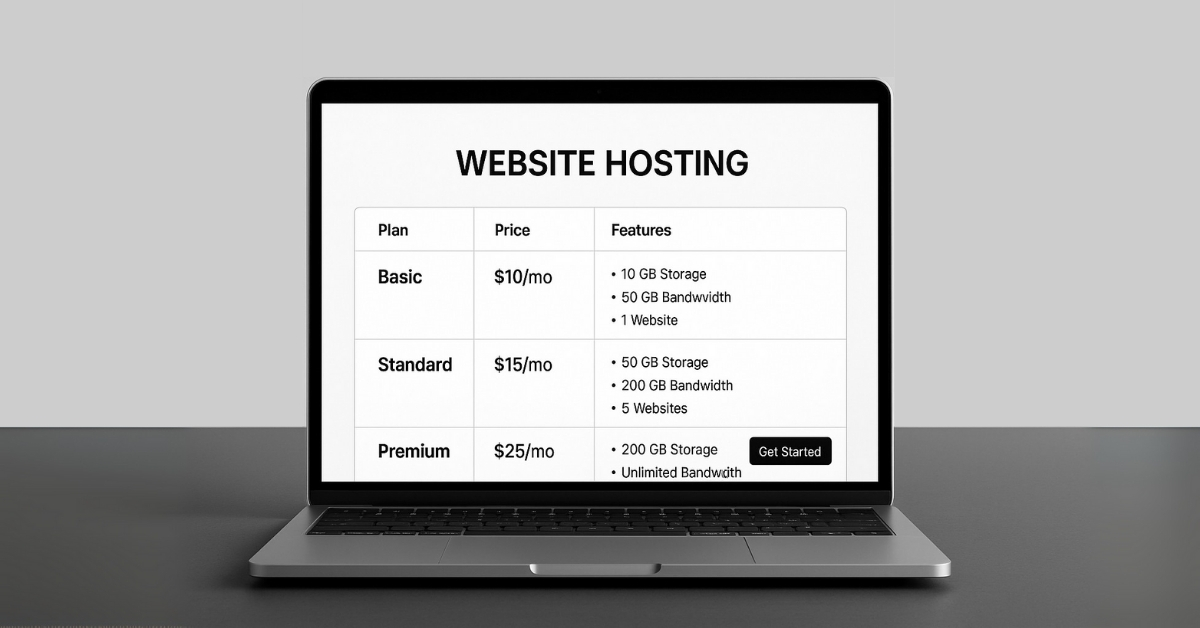How Much Is Website Hosting in 2025?
How Much Is Website Hosting in 2025? A Comprehensive Guide
When you’re launching a website or looking to switch hosting providers, one of the first questions that comes to mind is: How much is website hosting? In 2025, the landscape of website hosting is more competitive than ever. But here’s the thing: cheap hosting doesn’t have to be bad hosting. Whether you’re a small business, a blogger, or even an enterprise, there are hosting options out there that fit your budget without sacrificing quality.
In this article, we’ll break down the true cost of website hosting in 2025, dissect the factors that influence pricing, and help you find the best deal. By the end, you’ll have all the information you need to choose the perfect hosting solution, without the confusion of hidden fees or unexpected charges.
What is Website Hosting?
Before diving into costs, let’s start with the basics. Website hosting is a service that allows individuals or businesses to make their website accessible via the internet. Think of it as renting space on the internet where your website lives.
When you buy hosting, you’re essentially renting server space from a provider that will store your website files, images, databases, and all the content that makes up your site. This server is responsible for delivering the content of your website to users all around the world when they visit your domain name.
Types of Website Hosting
Not all hosting options are created equal. Here’s a quick rundown of the main types of hosting you’ll encounter.
i) Shared Hosting
The most affordable option, where multiple websites share the same server. It’s perfect for smaller websites or blogs.
ii) VPS Hosting (Virtual Private Server)
Offers more control and performance. It’s a step up from shared hosting, with fewer sites on the server.
iii) Dedicated Hosting
The whole server is yours. Perfect for large businesses or websites with high traffic.
iv) Cloud Hosting
A scalable option that spreads your website across multiple servers. It’s reliable and flexible, but can get expensive.
v) WordPress Hosting
A specialized hosting plan optimized for WordPress sites, with features like automatic updates, enhanced security, and faster loading times.
How Much Does Website Hosting Cost in 2025?
Now, let’s talk numbers. When you search for “how much is website hosting?” you’ll encounter a wide range of prices. But let’s simplify things. In 2025, here’s what you can expect.
Shared Hosting Prices
Basic Plans: As low as $1.98/month. These plans are ideal for personal blogs or small businesses just getting started. Expect limited resources (storage and bandwidth), but sufficient for low-traffic websites.
Intermediate Plans: Around $2.98/month. With these plans, you get more bandwidth and better storage options, suitable for growing websites or e-commerce stores.
Business Plans: Prices can go up to $4.98/month for premium shared hosting plans, often including unlimited bandwidth, 24/7 support, and additional features like a free domain name.
VPS Hosting Prices
VPS hosting generally starts at $20/month and can go up to $80/month depending on your needs. If your website is growing fast or you’re running a business, VPS hosting gives you more control and resources.
Dedicated Hosting Prices
Dedicated servers can range from $100/month to $500/month or more. This is a high-performance option for large websites or applications that demand the best in uptime, security, and speed.
Cloud Hosting Prices
Cloud hosting is flexible, and pricing is based on usage. Expect to pay $10/month to start, with scaling options. The more traffic you generate, the more you pay.
What Affects Website Hosting Pricing?
When looking for affordable hosting, you must understand the factors that influence the price
i) Hosting Type
Shared hosting will always be cheaper than VPS or dedicated hosting because you’re sharing resources with other websites.
ii) Storage and Bandwidth
The more storage and bandwidth you need, the higher the cost. If you’re running an e-commerce website with large media files, for example, you’ll need more resources.
iii) Security
Features like SSL certificates, DDoS protection, and backups can add to the cost of your hosting plan.
iv) Support
24/7 customer support typically comes at a higher price. Some budget hosts may offer limited support hours or ticket-based systems, while premium hosts provide live chat and phone support.
v) Renewal Rates
Initial prices are often discounted, but renewal rates can be much higher. Always check the renewal cost when comparing hosting plans.
vi) Add-ons
Some hosting providers charge for extras like email hosting, website builders, or marketing tools.
Benefits of Investing in the Right Website Hosting
Better Website Performance: A fast-loading website improves user experience and SEO rankings.
Scalability: As your website grows, your hosting can grow with it. VPS and cloud hosting allow for seamless scaling.
Security: Good hosting ensures your website is secure from hackers, with features like SSL certificates and firewalls.
Customer Support: Reliable hosting providers offer strong customer support to help you troubleshoot any issues.
Backups: Regular backups can save you from losing all your website data due to server crashes.
Hidden Costs to Watch Out For
When looking at website hosting prices, there are often hidden costs that catch people off guard. Here’s what you need to be aware of
i) Renewal Fees
Some hosting providers offer cheap initial pricing but have steep renewal rates after the first term. Always check the renewal price.
ii) Add-ons
Hosting companies often charge for extras like SSL certificates, site backups, and domain registration. Make sure these are included in the package you choose.
iii) Resource Limits
Some cheap hosting plans may offer “unlimited” bandwidth, but with conditions. If your site exceeds a certain threshold, they might slow down your site or ask for more money.
iv) Migration Fees
Moving your website to another host can cost you extra if your current provider doesn’t offer free migrations.
Common Mistakes When Choosing a Hosting Plan
i) Focusing Only on Price
While price is important, don’t choose a hosting plan solely because it’s cheap. If you sacrifice performance, you could end up losing more in the long run with downtime or poor site speed.
ii) Overestimating Your Needs
Avoid paying for features you don’t need. For example, if you have a small blog, you likely don’t need a dedicated server or unlimited bandwidth.
iii) Not Checking the Renewal Rates
Always look at the full cost, including renewals. Don’t be fooled by introductory offers.
iv) Ignoring Customer Support
Cheap hosting often means poor customer support. Make sure you choose a host that offers reliable, 24/7 support if you need help.
How to Choose the Right Hosting Plan
Choosing the right hosting plan depends on your specific needs. Here are some tips.
i) For Beginners or Small Websites
Shared hosting or entry-level VPS hosting should suffice. Go for a plan that offers a free domain and SSL.
ii) For Growing Websites
As your site grows, you’ll need more resources. VPS hosting or cloud hosting are good options for expanding businesses.
iii) For High-Traffic Websites
Dedicated hosting or cloud hosting is ideal for large websites or e-commerce stores with high traffic.
Conclusion
How much is website hosting? The answer depends on your needs, but now you understand the factors that influence pricing and how to find the best deal. Whether you’re just starting a blog or running an e-commerce store, it’s important to choose the right hosting plan that balances cost and performance.
The key takeaway? Don’t just go for the cheapest option. Look for value: hosting with good performance, solid customer support, and transparent pricing.
By understanding hosting costs, you’ll make an informed decision that keeps your website secure, fast, and scalable, without the surprises.
Frequently Asked Questions
Why are hosting prices so different?
The price of hosting depends on the resources and features you need. Shared hosting is cheaper because you share server resources with other users, whereas dedicated hosting gives you exclusive access to a server, which is more expensive.
Can I upgrade my hosting plan later?
Yes! Many providers offer easy upgrades from shared to VPS or from VPS to dedicated hosting as your website grows.
How do I know if I need VPS hosting?
If you have a growing website with higher traffic or need more control over your hosting environment (e.g., custom configurations), VPS hosting is a good option.







